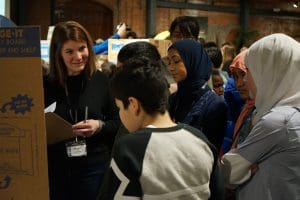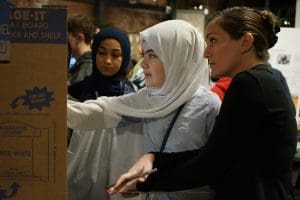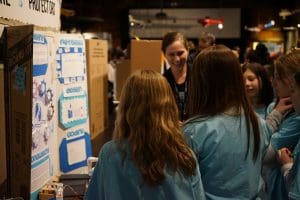 The Milton J. Rubenstein Museum of Science and Technology (MOST), located in Armory Square, in downtown Syracuse, recently hosted the Micron Robotics Challenge for kids located in the center of New York State, from Canada to the Pennsylvania border. The theme of this challenge was to “Combat the effects of climate change”, and participants were charged with identifying a climate change problem and then designing and constructing an automated device that tackles that issue. Two faculty – Laurie Ferger and Jaime Banks, and director of corporate relations Sarah Weber of the iSchool were tapped to be judges of this competition.
The Milton J. Rubenstein Museum of Science and Technology (MOST), located in Armory Square, in downtown Syracuse, recently hosted the Micron Robotics Challenge for kids located in the center of New York State, from Canada to the Pennsylvania border. The theme of this challenge was to “Combat the effects of climate change”, and participants were charged with identifying a climate change problem and then designing and constructing an automated device that tackles that issue. Two faculty – Laurie Ferger and Jaime Banks, and director of corporate relations Sarah Weber of the iSchool were tapped to be judges of this competition.
An assistant teaching professor specializing in web development at the iSchool, Laurie Ferger, also spends a lot of her time supporting digital literacy for young people. She was involved with a collaboration between the iSchool, the MOST, and AT&T for the Cuse Digital Literacy program last summer, which was a camp designed around teaching digital literacy to third through eighth graders from underrepresented populations. Ferger says, “I support any project that helps young folks learn more about tech. That’s why the MOST thought about asking me to do this. Syracuse University is part of the community, and judging this robotics competition is one tiny thing I can do to engage.”
 Jaime Banks is an associate professor at the iSchool and focuses her research on human-technology relationships. She is interested in robots, avatars, generative AI, and how people understand complex technologies. When Ferger asked her to help judge the competition, Banks jumped at the opportunity to volunteer. “Volunteering with MOST is a great way to contribute to community efforts to advance interest and literacy around science and technology. In this event, it happened to have had the added benefit of seeing how possible future change-makers are beginning to think about important problems through the lens of science and technology,” says Banks.
Jaime Banks is an associate professor at the iSchool and focuses her research on human-technology relationships. She is interested in robots, avatars, generative AI, and how people understand complex technologies. When Ferger asked her to help judge the competition, Banks jumped at the opportunity to volunteer. “Volunteering with MOST is a great way to contribute to community efforts to advance interest and literacy around science and technology. In this event, it happened to have had the added benefit of seeing how possible future change-makers are beginning to think about important problems through the lens of science and technology,” says Banks.
The iSchool is well-positioned to help bring digital literacy education to the greater Central New York community because of its formidable wealth of knowledge and resources. As Banks describes it, “the iSchool is full of experts at the intersections of technology and humanity. As thinkers in that space, it’s important not only that we teach our students to solve problems using best practices in science, computing, and innovation, but also that we serve as ambassadors for those efforts—to help others see how science and tech play important roles in advancing society.”
